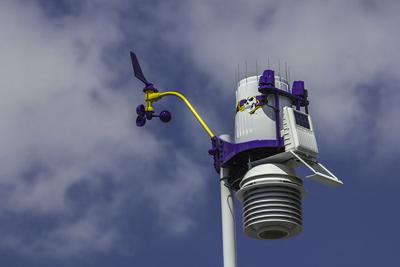In the past year, East Carolina University has dealt with all kinds of unpredictable weather, ranging from rain and snow to a hurricane that caused record-breaking flooding. In 2017, the university decided to take a few more preemptive measures in an effort to further improve weather forecasts.
On April 1 of 2017, ECU received a grant of $450,000 from the National Science Foundation, which was allocated for the purpose of conducting research on future forecasting. This grant will give students and local meteorologists the opportunity to accurately predict short-term and long-term weather patterns.
Dr. Tom Rickenbach and Dr. Rosana Ferreira, associate professors of atmospheric science at ECU, will be studying weather predictions over the next three years with this new allocation. Specifically, they will be studying the springtime transition of widespread rain from large weather systems to local rains from isolated thunderstorms.
“When you just look at precipitation without splitting it into these two components, it looks like it's just flat year-round,” said Ferreira.
During the weeks of late May and early June, weather patterns tend to transition quickly. According to Ferreira, it is hypothesized that this is caused by jet streams shifting north, as the North Atlantic subtropical high begins to feed warm, moist air into the southeastern United States.
“What we’re trying to understand is how the meteorological conditions, like the wind patterns and the amount of energy from the heating of the atmosphere, are changing in the springtime as we ramp up toward the turning-on of this afternoon thunderstorm regime,” Rickenbach said. “And we want to pinpoint the timing of that.”
Several graduate and undergraduate students will help Rickenbach and Ferreira participate in the research project and collect data.
“We are funding our graduate students to help address precipitation and weather,” Rickenbach said. “Undergraduates will help with the data analysis and be given the opportunity to present their original research at conferences.
In order to better understand future weather trends, Rickenbach, Ferreira and the students must start with the analyzation of current weather trends.
“We will use a regional weather model to make simulations of what is happening in the present climate,” Ferreira said. “Then repeat the simulations for the conditions we expect at the end of the century.”
A weather platform called WeatherSTEM was created to provide real-time weather readings, collect data, take photos and videos and automatically send weather updates to students’ Facebook and Twitter accounts.
With a platform like WeatherSTEM, weather forecasts are much more accurate and timely, which can allow officials such as ECU’s weather planner, Lauren Mink, to plan further ahead.
“The information can be used to make executive decisions during hazardous weather events, like this past spring commencement,” said Mink.
Mink found this platform appealing for a number of reasons, a primary one being the ability to easily access accurate measurements on-campus rather than other sources that may be further away, like the Pitt-Greenville Airport or other online websites.
When a storm approached prior to the 2017 spring commencement, it was WeatherSTEM’s measurements that helped influence the decision to cancel the event.
By studying various weather patterns and their respective mechanisms, future and long-term forecasting can be improved. Rickenbach and Ferreira’s project are already getting a head start with their new research venture.
“We have funded graduate student Hannah Wells,” Rickenbach said. “She has been doing the initial legwork. The actual work will begin in the fall. We plan on hiring students to do weather modeling and take their sophisticated work to help with understanding seasonal transitions.”
With the research conducted under Rickenbach, Ferreira and WeatherSTEM, only time will tell if current weather trends will continue to grow or change in the upcoming years.







(0) comments
Welcome to the discussion.
Log In
Keep it Clean. Please avoid obscene, vulgar, lewd, racist or sexually-oriented language.
PLEASE TURN OFF YOUR CAPS LOCK.
Don't Threaten. Threats of harming another person will not be tolerated.
Be Truthful. Don't knowingly lie about anyone or anything.
Be Nice. No racism, sexism or any sort of -ism that is degrading to another person.
Be Proactive. Use the 'Report' link on each comment to let us know of abusive posts.
Share with Us. We'd love to hear eyewitness accounts, the history behind an article.